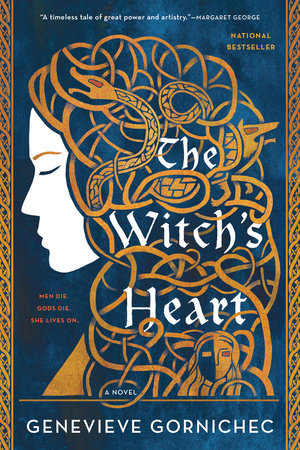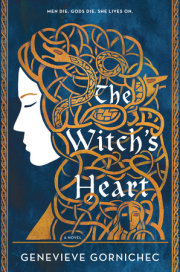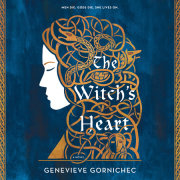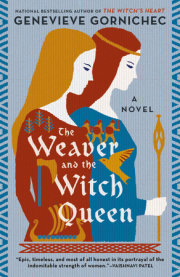Long ago, when the gods were young and Asgard was new, there came a witch from the edge of the worlds. She knew many ancient spells, but she was especially skilled with seid, a magic that allowed one to travel out of body and divine the future. This greatly appealed to Odin, the highest of the Aesir; when he learned of her abilities, he offered to impart upon the witch his knowledge of the runes in exchange for teaching him seid.
She was uncertain at first. She'd heard enough about Odin to make her hesitate. But she knew he did not share his secrets lightly, which meant her knowledge of seid must be of great value to him indeed. So she swallowed her suspicions about this grim one-eyed god and accepted his offer.
As they practiced seid together, the witch found herself drawn farther down than she'd ever traveled before, where she brushed against a place darker than the beginning of time itself. This place frightened her, and the secrets contained there were great and terrible, so she did not dare go deeper-much to Odin's displeasure, for the knowledge he sought above all else was hidden there, and it seemed to him that only she could reach it.
The witch was also teaching her magic to the Aesir's rivals, the Vanir, a sister race of gods whose home she had passed through on her way to Asgard. The Vanir could think of naught but gold with which to reward the witch for her services, though she cared little enough for it.
But when Odin realized she was traveling between Asgard and Vanaheim, he saw an opportunity. He turned the Aesir against the witch and called her Gullveig, "gold-lust." They drove spears through her and burned her three times, and three times she was reborn-for she was very old, very hard to kill, and far more than she appeared. Each time she burned, Odin tried to force her down to the dark place to learn what he wanted to know, and each time she resisted. And when the Vanir heard of the Aesir's treatment of her, they became furious, and thus was the first war in the cosmos declared.
The third time she was reborn, Gullveig fled, though she left something behind: her speared heart, still smoking on the pyre.
That was where he found it.
Some time later, he tracked her to the deepest, darkest forest at the farthest edge of Jotunheim: the land of the giants, the Aesir's bitter enemies. This forest was called Ironwood, where the gnarled gray trees were so thick that there was no real path through them, and so tall that they blocked out the sun.
He did not have to venture into those woods, though, for by the bank of the river that divided Ironwood from the rest of Jotunheim he found the witch, staring across the water at the dense forest and mountains beyond. She sat upon a rough woolen blanket with a thick cloak about her shoulders and a hood pulled over her head. The sun was shining, but she sat in the shade, hands folded in her lap, leaning against a tree trunk.
He watched her for a time, shifting from foot to foot, scratching his nose, listening to the quaint gurgling of the river and the whistling of songbirds. Then he sauntered up to her, his hands clasped behind his back. He could see only the bottom half of her face, but her skin looked pink-tender, healing, new. When he got closer, he noticed the skin of her hands was the same. She seemed to be resting peacefully. Part of him didn't want to disturb her.
Then again, he'd always found the idea of peace to be quite boring.
"How long are you going to stand there?" she rasped. She sounded like she hadn't had anything to drink in an age and a half. He figured that breathing in the smoke from one's own pyre three times would have that effect on a person.
"You're a difficult woman to find," he replied. Truth be told, he wasn't sure how to proceed. He'd come to return what she'd left in Odin's hall-and for something more, though he didn't know exactly what.
Something had drawn him to Ironwood that day with her heart tucked into his haversack. And he had a feeling that whatever was pulling him down this path was important, was special, was interesting, for he was so very easily bored.
And now here he was, enticed by the possibility of some excitement and hoping the witch would not disappoint.
She didnÕt reply at first, opting instead to study the strange man whoÕd approached her. The sun was shining behind him, so she couldnÕt quite make out his features-just a deep green traveling cloak and hood, brown pants, brown leather shoes, and the silhouette of wild hair.
"I really admire your work," he said conversationally. "You know-sowing chaos wherever you go. Making mighty beings fight over your talents. It's impressive, really."
A moment passed before she said, "That was not my intention."
"What was it, then?"
She did not reply.
"Well, if you're planning on doing it again," he said, "I would love to watch and possibly participate, so long as I don't get caught. But I'll let you know up front that I shall not, under any circumstances, make you a promise I can't talk my way out of. I'm not usually this straightforward about it, so consider yourself lucky. I'm letting you know as a friend."
"A friend?" The word was foreign to her.
"Yes. I've decided it just now." He cocked his head. "Am I your first friend? What an achievement for you."
She ignored the question. "Seems a rather one-sided decision on your part."
"Well, I see you're not exactly surrounded by admirers." He studied her. "You seem to me to be nothing more than a harmless witch from the backwoods-I haven't heard anyone talk like you for a very long time. I'm surprised the Aesir could even understand your accent. Who are you? Where do you come from?"
"I don't know," she said after a moment. She inclined her head such that she could see him, but he couldn't quite see her. "I could ask you the same question about yourself, and probably wouldn't know the answer, either."
"Oh yes?" He settled down on his haunches and peered at her. She could see now that he had a pale, angular face, a sharp, slightly upturned nose that gave him an impish look, and shoulder-length dark blond hair that fell somewhere between wavy and curly. His eyes were grass green; his smile was mischievous.
The witch nodded once in reply.
His smile faltered a bit. "And how could you possibly know that?"
"I know things," she said. "You may have heard."
"I may have heard that your knowing of things was what got you stabbed and lit on fire, multiple times. Perhaps from now on you should just play dumb."
"Well, that's no fun," she said, only half joking, her hand moving instinctively to the vertical slash between her breasts-the place where they'd stabbed out her heart.
"That's the spirit!" He laughed as he rummaged around in his bag. After a moment he pulled out a wad of cloth and held it out to her.
She took it-and started when she felt the bundle pulsing rhythmically in her hands.
"Your heart," he explained. "I was going to eat it, for some reason, but I decided that maybe you should have it back."
"Eat it?" she asked, making a face. "Why?"
He shrugged. "I don't know. To see what would happen."
"You would've eaten the heart of a witch, and that cannot be good for your well-being," she said dryly; she frowned as she unwrapped it. "It seems to have healed quite a bit from the fire. But . . ."
"But there's still a hole in it," he finished for her. "You got stabbed. Perhaps it shall heal completely if you put it back where it belongs. Do it now-I won't look."
"It can wait." She replaced the cloth and looked at him. "Thank you."
"You're welcome." He sat down now, stretched one leg out, and propped his elbow up on the other knee. "So, I take it you're not going by Gullveig anymore. What do they call you now?"
"I'm not sure." She looked at him sideways as he plucked a long piece of grass out of the ground, put it in his mouth, and let it dangle lazily there, and she noticed the splash of freckles across his nose and cheeks, and how the sun behind him turned the outline of his curls a violent orange.
She was still not sure what to make of this man. It was difficult to decide how much she should tell him.
"You don't know your own name?" he asked, raising his eyebrows.
She shrugged. "I thought I would like to travel, in which case they would call me something depending on the nature of my wanderings." She cast a glance across the river at the gray thickets of Ironwood. "Though I may yet decide to rest here for a time."
"And what will you call yourself, then, if you stay?"
She considered this for a moment or two before she said, "Angrboda."
His wrinkled his nose, and the blade of grass drooped. "What? 'Proclaimer of sorrows'? That's an odd name. Why would I want to be your friend if that's all you're going to do?"
"You're the one who decided we were friends," she said. "And besides, it's not you to whom I'll bring sorrow."
"Are all witches as cryptic as you are?"
"I don't know if I've met any other witches, though I think some used to live in these woods, too, long ago." She looked to the other side of the river again and lowered her voice almost reverently. "They say there was one witch here who bore the wolves that chase the sun and moon, and raised many others still."
"Right. I heard stories about them, growing up. The Old One and her wolf-children."
"You heard those stories in Asgard?"
"Well, I'm not from Asgard. Anyway, everyone knows the stories out here."
"You're a giant," she said. It was a guess on her part, but she did not make it sound like a question. "Giant" was a misnomer: a name, not a descriptor, for giants were often no larger than the average person. And while her visitor was certainly dressed like one of the Aesir, sometimes there was no physical way to tell a god from a giant.
But this man, traveling alone and undisguised . . . There was something wild about him, something about his eyes that spoke of deep forests and midsummer nights. Something untamed, unharnessed.
He cannot be a god, can he?
He shrugged a shoulder at her deduction. "Sort of. Anyway, it seems rather empty around here now. No wolves . . . no witch-mother . . ."
"Indeed." She looked across the river again, feeling a pang in her empty chest. "But maybe it was me. Maybe I was their mother."
"You don't remember, though?"
She shook her head. "I don't."
Silence fell between them, and he shifted. She got the feeling he hated when conversations lulled; he had the air of one who enjoyed hearing his own voice.
"Well," he said at last, "I'll have you know that I'm going to make it my personal mission to ignore all your depressing prophecies and do whatever I feel like doing."
"You can't just ignore prophecies."
"You can if you try hard enough."
"I'm not quite sure that's how it works."
"Hmm." He put his arms behind his head, leaned against the tree, and said haughtily, "Well, maybe you're just not as clever as I am."
She gave him a sidelong look, amused. "What do they call you, then, Sly One?"
"I'll tell you if you show me your face."
"I'll show you my face if you promise not to recoil in horror."
"I said I'd tell you my name. I can't promise anything more. But trust me, I have a strong stomach-I was going to eat your heart, after all."
"My heart is not so full of vile things, I promise you." Nevertheless, she lifted the hood, revealing heavy-lidded blue-green eyes and the brown stubble of her burned hair. These had not been Gullveig's colors, but Angrboda figured that she should leave that particular name and all its associations behind her and never mention it again.
This was a new phase in her existence. She was going to keep the witchery to herself from now on, thank you very much. No more seid, no more prophecies, no more getting into trouble. She'd already had enough of that for several lifetimes.
"And here I thought you were going to be some hideous ogress hiding under there." He raised his hands and curled them into claws. "Angrboda Troll-woman, so ugly that men flinch away in terror to look upon her face."
She rolled her eyes. "And what's your name? Or do you intend to break your promise?"
"I intend no such thing. I am a man of my word, Angrboda. I'm the blood brother of Odin himself," he said loftily, and put a hand to his chest.
Ah, there it is, she thought. She did not remember Odin taking a giant for a blood brother when she was in Asgard. But then again, that could have been centuries ago, for all she knew-she remembered very little of her time in Asgard and next to nothing from the time before that. Perhaps her strange visitor just hadn't been present in the hall where she'd been burned.
Or maybe he was and was watching it, rapt. Like all the rest.
"And I can't believe," he went on, "that you would besmirch my good name by implying that I'm an oath-breaker-"
"I would have to know your name in order to besmirch it, would I not?"
"You're besmirching the idea of my good name."
"The idea of your name itself, or the idea that it's a good name?"
He blinked at her and mouthed the word Oh.
"I shall make up a name for you if you don't tell me what it is," she said.
"Ooh, very interesting." He wrapped his arms around his knees like an excited child. "What did you have in mind?"
"You won't like it, that's for sure. I'm going to call you the worst name I can think of, and use my witchy magic to make everyone else call you that, too."
"'Witchy magic'? Oh, I'm so frightened."
"Don't make me make you eat this," Angrboda said warningly, holding up her cloth-wrapped heart.
Copyright © 2021 by Genevieve Gornichec. All rights reserved. No part of this excerpt may be reproduced or reprinted without permission in writing from the publisher.









